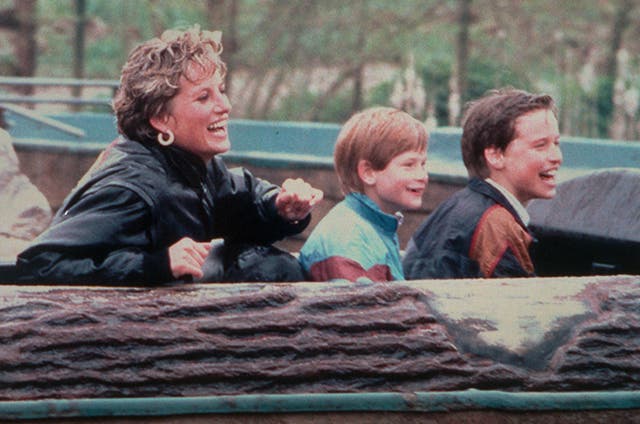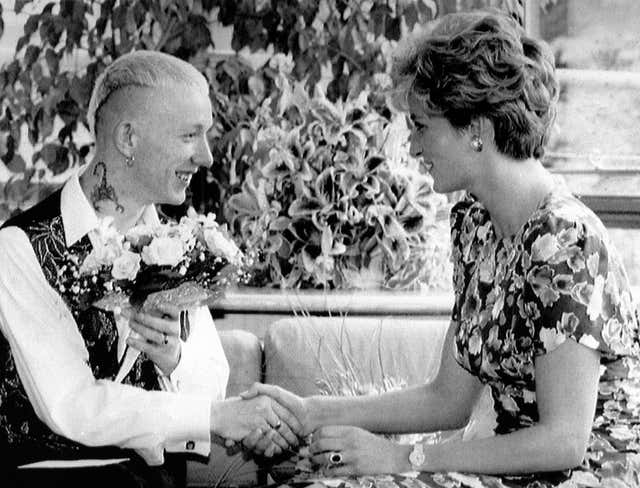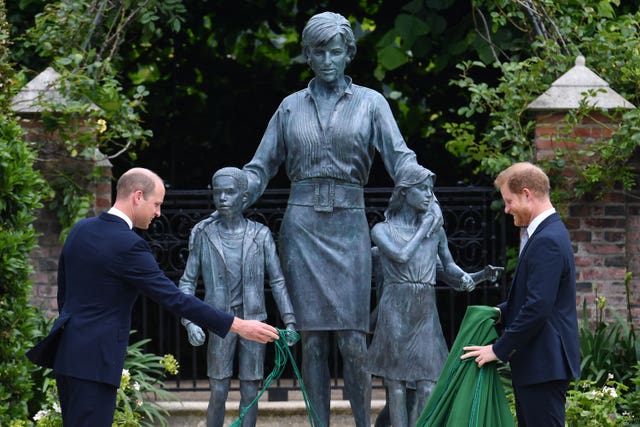Diana, Princess of Wales’s ability to “connect” with people remains one of her most enduring legacies a charity boss has said on the eve of the 25th anniversary of her death.
Diana’s death in 1997 shocked the world and in the decades that have followed her influence has been seen in the causes supported by royals, the way they conduct themselves and even in their fashion choices.
Her son the Duke of Sussex has said he will “share the spirit” of his mother with his children when he marks the anniversary of her death on Wednesday.
Tessy Ojo, chief executive officer of The Diana Award, established to promote the princess’s belief young people have the power to change the world for the better, has paid tribute to the royal and described how she left flowers at Kensington Palace after Diana was killed in a car crash.
Ms Ojo said: “Her ability to connect with people though kindness and compassion is one of her most significant legacies. She left a mark on all our lives.”
She added: “Diana, Princess of Wales, believed that young people have the power to change the world. Continuing her legacy also means building the capacity of young people to change their world by tackling the big issues of our time.

“Like Diana, Princess of Wales they’re not afraid to speak out and be at the forefront of change. I can only imagine how immensely proud she would be of the tens of thousands of young people from across the world who are continuing her legacy.”
Fans of Diana are expected to gather at her former home of Kensington Palace and remember the royal who died in a Paris car crash on August 31 1997.
When Diana died aged 36 she was embarking on a new period of her life, free from the restraints of being a member of the monarchy and intent on using her position to champion the causes close to her heart.

Her greatest legacy has been her sons, the Dukes of Cambridge and Sussex, who embody her beliefs and values and have spoken about how their mother is still guiding them.
Speaking last week after a fundraising polo match for his charity Sentebale, named in memory of his mother, Harry said about the anniversary of her death: “I want it to be a day filled with memories of her incredible work and love for the way she did it.
“I want it to be a day to share the spirit of my mum with my family, with my children, who I wish could have met her.
“Every day, I hope to do her proud. She was tireless in her work to support and destigmatise those experiencing HIV/AIDS. Fittingly, her favourite flowers were forget-me-nots.”

Diana broke new ground by championing issues such as Aids awareness – famously holding the hand of a man with the illness – or highlighting homelessness and joining campaigners calling for a ban on landmines.
Her fashion sense made her a cover star for magazines and newspapers across the globe and even after she broke away from the royal family was still seen as the modern face of the monarchy.
Diana’s sons jointly paid tribute to their mother last summer on July 1 when they unveiled a statue of the princess in the garden of Kensington Palace.
Divided on many issues, William and Harry put on a united front.

The princess gave a controversial interview to the BBC Panorama programme saying “well, there were three of us in this marriage, so it was a bit crowded” – a reference to Camilla Parker Bowles, who Charles later married.
The BBC vowed last month never to broadcast the interview again in the wake of the Dyson inquiry, which found journalist Martin Bashir had used “deceitful behaviour” to secure the scoop.
He faked bank statements which he showed to Diana’s brother Earl Spencer to gain access to the princess.
William and Harry, in separate statements, condemned the BBC for its treatment of their mother, with William saying the interview fuelled her “fear, paranoia and isolation”, and Harry saying “the ripple effect of a culture of exploitation and unethical practices ultimately took her life”.




Comments: Our rules
We want our comments to be a lively and valuable part of our community - a place where readers can debate and engage with the most important local issues. The ability to comment on our stories is a privilege, not a right, however, and that privilege may be withdrawn if it is abused or misused.
Please report any comments that break our rules.
Read the rules hereLast Updated:
Report this comment Cancel